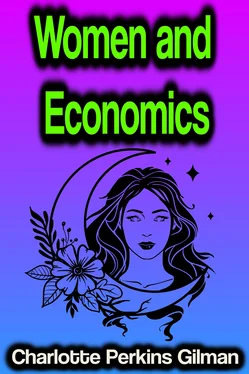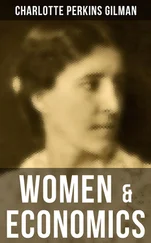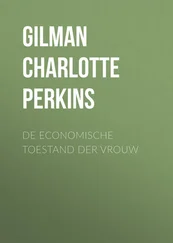Studied individually, the facts are even more plainly visible, more open and familiar. From the day laborer to the millionnaire, the wife's worn dress or flashing jewels, her low roof or her lordly one, her weary feet or her rich equipage,–these speak of the economic ability of the husband. The comfort, the luxury, the necessities of life itself, which the woman receives, are obtained by the husband, and given her by him. And, when the woman, left alone with no man to "support" her, tries to meet her own economic necessities, the difficulties which confront her prove conclusively what the general economic status of the woman is. None can deny these patent facts,–that the economic status of women generally depends upon that of men generally, and that the economic status of women individually depends upon that of men individually, those men to whom they are related. But we are instantly confronted by the commonly received opinion that, although it must be admitted that men make and distribute the wealth of the world, yet women earn their share of it as wives. This assumes either that the husband is in the position of employer and the wife as employee, or that marriage is a "partnership," and the wife an equal factor with the husband in producing wealth.
Economic independence is a relative condition at best. In the broadest sense, all living things are economically dependent upon others,–the animals upon the vegetables, and man upon both. In a narrower sense, all social life is economically interdependent, man producing collectively what he could by no possibility produce separately. But, in the closest interpretation, individual economic independence among human beings means that the individual pays for what he gets, works for what he gets, gives to the other an equivalent for what the other gives him. I depend on the shoemaker for shoes, and the tailor for coats; but, if I give the shoemaker and the tailor enough of my own labor as a house-builder to pay for the shoes and coats they give me, I retain my personal independence. I have not taken of their product, and given nothing of mine. As long as what I get is obtained by what I give, I am economically independent.
Women consume economic goods. What economic product do they give in exchange for what they consume? The claim that marriage is a partnership, in which the two persons married produce wealth which neither of them, separately, could produce, will not bear examination. A man happy and comfortable can produce more than one unhappy and uncomfortable, but this is as true of a father or son as of a husband. To take from a man any of the conditions which make him happy and strong is to cripple his industry, generally speaking. But those relatives who make him happy are not therefore his business partners, and entitled to share his income.
Grateful return for happiness conferred is not the method of exchange in a partnership. The comfort a man takes with his wife is not in the nature of a business partnership, nor are her frugality and industry. A housekeeper, in her place, might be as frugal, as industrious, but would not therefore be a partner. Man and wife are partners truly in their mutual obligation to their children,–their common love, duty, and service. But a manufacturer who marries, or a doctor, or a lawyer, does not take a partner in his business, when he takes a partner in parenthood, unless his wife is also a manufacturer, a doctor, or a lawyer. In his business, she cannot even advise wisely without training and experience. To love her husband, the composer, does not enable her to compose; and the loss of a man's wife, though it may break his heart, does not cripple his business, unless his mind is affected by grief. She is in no sense a business partner, unless she contributes capital or experience or labor, as a man would in like relation. Most men would hesitate very seriously before entering a business partnership with any woman, wife or not.
If the wife is not, then, truly a business partner, in what way does she earn from her husband the food, clothing, and shelter she receives at his hands? By house service, it will be instantly replied. This is the general misty idea upon the subject,–that women earn all they get, and more, by house service. Here we come to a very practical and definite economic ground. Although not producers of wealth, women serve in the final processes of preparation and distribution. Their labor in the household has a genuine economic value.
For a certain percentage of persons to serve other persons, in order that the ones so served may produce more, is a contribution not to be overlooked. The labor of women in the house, certainly, enables men to produce more wealth than they otherwise could; and in this way women are economic factors in society. But so are horses. The labor of horses enables men to produce more wealth than they otherwise could. The horse is an economic factor in society. But the horse is not economically independent, nor is the woman. If a man plus a valet can perform more useful service than he could minus a valet, then the valet is performing useful service. But, if the valet is the property of the man, is obliged to perform this service, and is not paid for it, he is not economically independent.
The labor which the wife performs in the household is given as part of her functional duty, not as employment. The wife of the poor man, who works hard in a small house, doing all the work for the family, or the wife of the rich man, who wisely and gracefully manages a large house and administers its functions, each is entitled to fair pay for services rendered.
To take this ground and hold it honestly, wives, as earners through domestic service, are entitled to the wages of cooks, housemaids, nursemaids, seamstresses, or housekeepers, and to no more. This would of course reduce the spending money of the wives of the rich, and put it out of the power of the poor man to "support" a wife at all, unless, indeed, the poor man faced the situation fully, paid his wife her wages as house servant, and then she and he combined their funds in the support of their children. He would be keeping a servant: she would be helping keep the family. But nowhere on earth would there be "a rich woman" by these means. Even the highest class of private housekeeper, useful as her services are, does not accumulate a fortune. She does not buy diamonds and sables and keep a carriage. Things like these are not earned by house service.
But the salient fact in this discussion is that, whatever the economic value of the domestic industry of women is, they do not get it. The women who do the most work get the least money, and the women who have the most money do the least work. Their labor is neither given nor taken as a factor in economic exchange. It is held to be their duty as women to do this work; and their economic status bears no relation to their domestic labors, unless an inverse one. Moreover, if they were thus fairly paid,–given what they earned, and no more,–all women working in this way would be reduced to the economic status of the house servant. Few women–or men either–care to face this condition. The ground that women earn their living by domestic labor is instantly forsaken, and we are told that they obtain their livelihood as mothers. This is a peculiar position. We speak of it commonly enough, and often with deep feeling, but without due analysis.
In treating of an economic exchange, asking what return in goods or labor women make for the goods and labor given them,–either to the race collectively or to their husbands individually,–what payment women make for their clothes and shoes and furniture and food and shelter, we are told that the duties and services of the mother entitle her to support.
If this is so, if motherhood is an exchangeable commodity given by women in payment for clothes and food, then we must of course find some relation between the quantity or quality of the motherhood and the quantity and quality of the pay. This being true, then the women who are not mothers have no economic status at all; and the economic status of those who are must be shown to be relative to their motherhood. This is obviously absurd. The childless wife has as much money as the mother of many,–more; for the children of the latter consume what would otherwise be hers; and the inefficient mother is no less provided for than the efficient one. Visibly, and upon the face of it, women are not maintained in economic prosperity proportioned to their motherhood. Motherhood bears no relation to their economic status. Among primitive races, it is true,–in the patriarchal period, for instance,–there was some truth in this position. Women being of no value whatever save as bearers of children, their favor and indulgence did bear direct relation to maternity; and they had reason to exult on more grounds than one when they could boast a son. To-day, however, the maintenance of the woman is not conditioned upon this. A man is not allowed to discard his wife because she is barren. The claim of motherhood as a factor in economic exchange is false to-day. But suppose it were true. Are we willing to hold this ground, even in theory? Are we willing to consider motherhood as a business, a form of commercial exchange? Are the cares and duties of the mother, her travail and her love, commodities to be exchanged for bread?
Читать дальше












